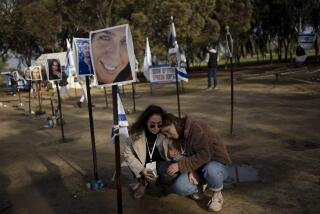Former Prisoner of Mao Bears Scars but Finds a Second Life : China: Nien Cheng survived interrogators, despair and disease to describe her imprisonment during Cultural Revolution.
- Share via
HONG KONG — Sometimes, in those quiet moments before dawn, Nien Cheng wakes up dreaming she is still in solitary confinement at the No.1 Detention House in Shanghai.
Then, slowly, the jail cell of her nightmare fades into the familiar furnishings of her home in Washington, D.C. “It’s an indescribable feeling of relief,” she says.
The crime that put her in that dank cell was writing to a friend about the food situation in Shanghai. “Foreign spy,” charged the leftist fanatics who locked her up for 6 1/2 years.
Surviving interrogators, despair and disease, Cheng emerged to write “Life and Death in Shanghai,” the harrowing, best-selling account of her imprisonment during China’s 1966-76 Cultural Revolution.
Millions died, were jailed or persecuted when the political movement launched to bolster former leader Mao Tse-tung’s power degenerated into anarchy. Chinese still refer to it darkly as “The Ten Years of Chaos.”
“What happened to me was nothing,” says Cheng, gazing through her hotel window at the boats in Hong Kong’s bustling harbor. “So many people had much worse.”
Then she rolls back the cuffs of her cardigan to show wrists scarred by the handcuffs her jailers used in an effort to break her. The cuffs sawed the nerves in her hands, so that now they stiffen in cold weather.
The Red Guards, youths whipped up by Mao’s call to revolution, killed Cheng’s 24-year-old daughter, Meiping. They ransacked her home, destroying most of her possessions.
Cheng’s survival is testimony to the fierce courage that burns in her hazel-brown eyes. Her easy, tinkling laugh turns the eyes mischievous and rocks her tiny frame. She doesn’t look 78.
Cheng was in Hong Kong to deliver a speech and meet the producers of the film version of “Life and Death.”
The film is to be directed by Chen Kaige, this year’s Cannes Film Festival winner with “Farewell to My Concubine.” But shooting may have to wait a year or two until the Chinese government is ready for it.
The producers, Thomson Films, want to film in Shanghai for authenticity, but feel China’s leaders might not approve. The book was published in China in a censored version that expunged Cheng’s harshest judgments of Mao Tse-tung. The same may happen to the film script, especially because 1993 is the centenary of Mao’s birth.
“This is the worst year to make a film,” says Cheng. Mao, who died in 1976, “is still worshiped. The Communist Party wants the people to have a symbol.”
The current Beijing government, she surmises, would prefer the Cultural Revolution to be forgotten. “But it’s impossible to forget.”
Cheng’s face screws up in pain at the mention of her only child, Meiping, a young film actress who was thrown from a window to her death while her mother languished in prison.
Cheng found out about it when she asked for clothes to replace her tattered prison garb, and the guards brought her Meiping’s clothes. “That was a ghastly moment,” she recalls.
Cheng’s husband, whom she met as a student in London in 1935, died of cancer in 1957, before the Cultural Revolution. After her release in 1973, Cheng needed a hysterectomy because of hormone disorders caused by the stress and conditions in jail.
As a former employee of the Shell Oil company and daughter of a high official in the pre-communist era, Cheng made an obvious target for the anti-foreign, anti-wealth Cultural Revolution.
She had relatives in the United States. She was good friends with the former British charge d’affaires in China. She belonged to Shanghai’s cultural elite.
After her release, she was declared a victim of wrongful arrest. She left China in 1980, vowing never to return. Six years later, her book was published in the West to critical acclaim.
Today, Cheng betrays no bitterness. “Americans and Britishers think it is rather extraordinary that I didn’t die in prison,” she says coolly. “But I didn’t die, because I’m a Chinese and Chinese have an ability to survive.
“If I hadn’t written the book, I would be sitting in my condominium by myself, reading, with a few old lady friends. I have a wonderful life in America because of the book.”
President Ronald Reagan and his wife, Nancy, invited her to the White House. She is in worldwide demand on the lecture circuit, and fans constantly phone her, having found her number in the Washington directory. Callers hear a woman whose warm Shanghai lilt is laced with newly acquired Americanisms.
“They call me and say, ‘Nien Cheng, I read your book . . . could we come and see you?’ The only place in American territory I haven’t had a telephone call from is Alaska.”
Chinese readers write saying her book prompted them to discuss their own Cultural Revolution experiences, she says. She is writing a second book, about her early life.
On the desk in the hotel room is a copy of the new biography of Chinese leader Deng Xiaoping. Like Cheng, he was a victim of the Cultural Revolution. Red Guards threw his son, Deng Pufang, from a window and he has been in a wheelchair ever since.
Deng, now 89, was dismissed as vice premier and sent to work a lathe in a tractor factory. He, too, proved a gritty survivor, returning to power to steer China onto a path of economic reform that has unleashed no less than a second revolution.
Cheng says Deng “will go down in history as a greater man than Mao,” because his reforms have brought a prosperity previously unknown in China.
More to Read
Sign up for Essential California
The most important California stories and recommendations in your inbox every morning.
You may occasionally receive promotional content from the Los Angeles Times.













